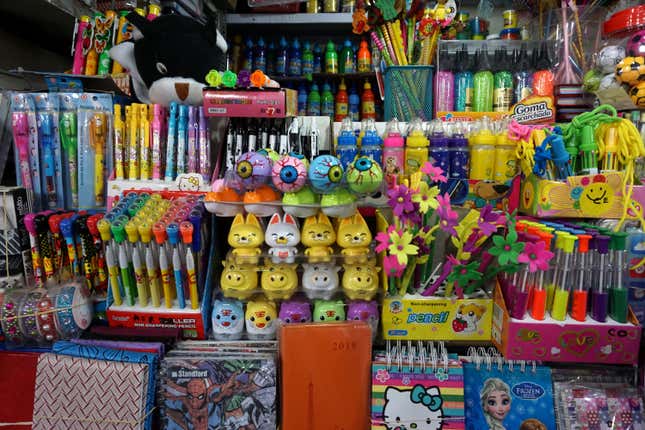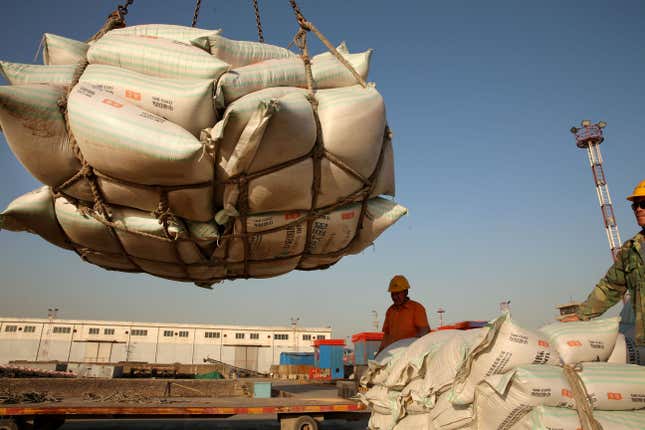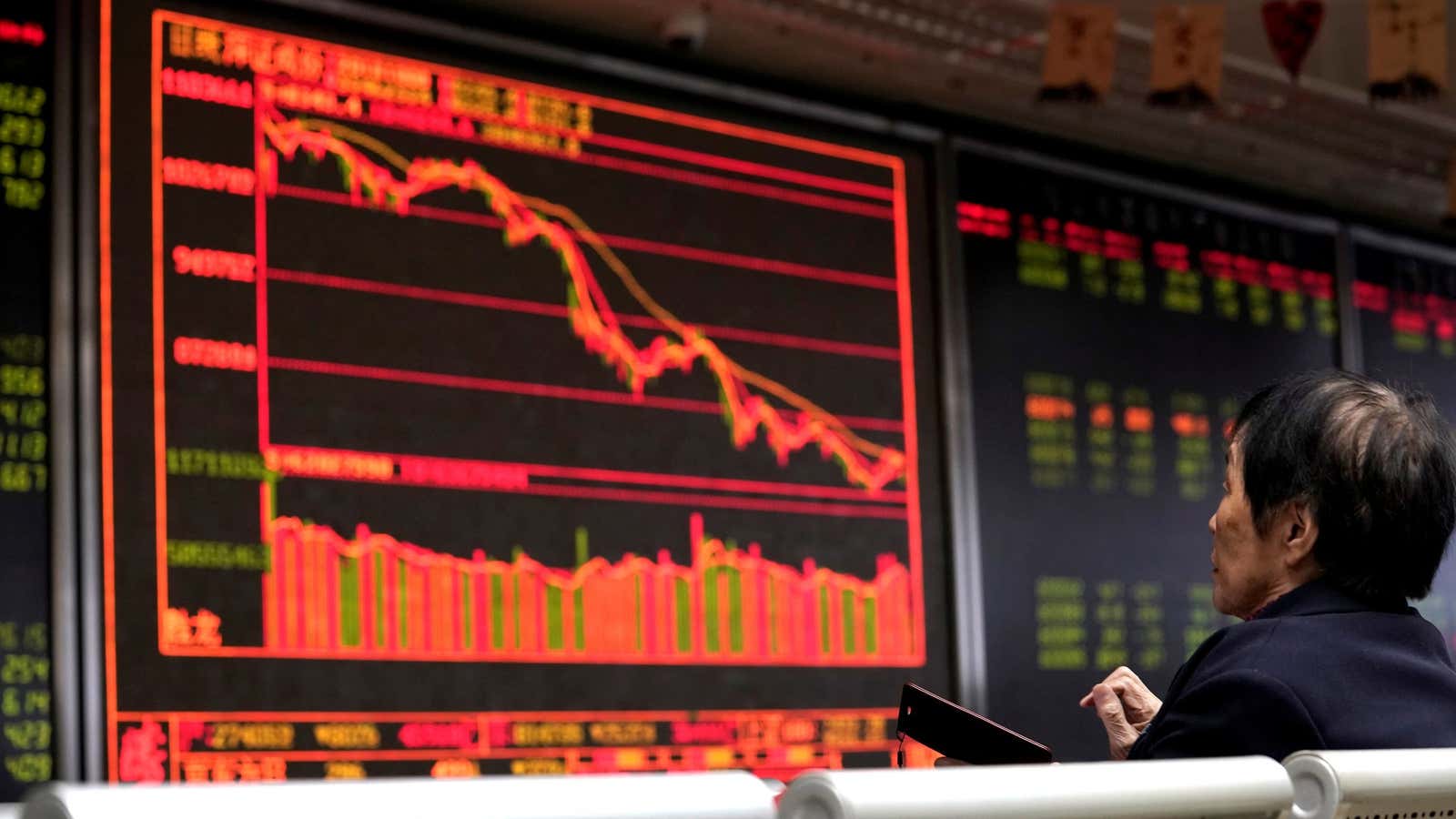China’s ardent determination to win the trade war might not have all the public support it would like.
Since the US and China entered a trade war in earnest this year, both sides have been going tit-for-tat with increasing tariffs on goods. The US has put new tariffs on $250 billion in Chinese imports, while China has done the same to $110 billion worth of US goods. And while China’s running out of US goods to keep the retaliation going, its strongest weapon in this “war of national fate” with the US is the spirit of the Chinese people, according to state media.
“The heroism of ‘being the first to show concern and the last to enjoy oneself’ has always run through Chinese blood, which also includes the spirit of ‘sacrificing one’s interest for the greater good of the public,'” said an opinion piece (link in Chinese) posted by the state-run People’s Daily on July 10. “Facing this ‘war of national fate,’ Chinese are deeply aware that ‘there’s no home without a country,’ so they are willing to bear temporary losses.”
That comment doesn’t acknowledge how painful the trade war could become for common people. Economists estimate that if the latest Chinese goods to be added to the trade war see tariffs go up to 25% next year, it could shave half a percentage point off China’s growth. Online, people are sharing how they’re experiencing the impacts so far, and worrying about what’s to come.
Stocks tumble, yuan devalues
On Monday (Oct.7), the first day after the Golden Week holiday, Chinese stocks fell sharply. The benchmark Shanghai Composite Index fell 3.7%—its biggest single-day loss (paywall) in more than three months. The stock tumble came a day after China’s central bank announced that it would cut the reserve requirement ratio for commercial banks for the fourth time this year—a move seen as trying to boost the economy by increasing liquidity amid the trade war. In general, China’s stock markets haven’t been (paywall) taking the trade war in stride.
“This has been a tough year for me. I haven’t received payments on several projects because of stock bursts,” wrote a user (link in Chinese) of social media platform Weibo, who identified himself as working at a securities firm in Beijing. “The stock market’s tumble and the trade war have killed many projects. When I returned home, the village officials asked me how’s my work so far this year. My answer, sadly, was this—deleveraging, bad stock performance, and the trade war have utterly messed up my life.”

The devalued yuan has also worried many. While it could help exporters by making their goods more competitive, it makes life tougher for people who need foreign currency, for example families of the hundreds of thousands of Chinese studying abroad.
“We are now kneeling to the trade war. It’s hard to see that the RMB [renminbi] can be stable in the near term. Looks like the Great Depression is going to arrive,” said a Weibo comment (link in Chinese).
Snacks, oil prices up
Treats are suddenly more expensive due to tariffs, and so are daily necessities.
“I ran out of nuts yesterday and wanted to top up my stock,” wrote a female user (link in Chinese) based in northern Hebei province, but she found the nuts she’s used to eating every day, including pecans, commonly sourced from the US, cost her more.
“I asked the shop owner, ‘Why is it more expensive than last time?’ The owner said it’s because of the trade war,” she continued, “And I asked him, ‘What’s the relationship?’ He said that he had imported lots of the nuts from overseas. This is the first time I feel the impact of the trade war.”
As for Maine lobster, forget about it.
Chinese drivers are also feeling the pinch, with China putting tariffs on US oil imports in August.
“I’ve deeply felt that the economic environment is not good. This year, there’s peer-to-peer lending and illegal money-raising crackdown, which also bled out a bunch of people. Now the drop has come to the real estate market…. then there’s the trade war, and oil prices keep going up. It won’t be long before I can’t afford to run my car,” wrote a user (link in Chinese).
Small businesses may be harder hit than larger ones. The most recent Caixin manufacturing Purchasing Managers Index, a better gauge of sentiment at smaller, private firms than the official manufacturing PMI, declined from 50.6 in August to 50 last month, the lowest level in more than a year. A number below 50 indicates a contraction.

Pessimism about the new NAFTA
People aren’t optimistic the pressure on China’s economy will ease up. In fact, the new North American Free Trade Agreement renegotiated by the US, Mexico, and Canada—now with a brand-new acronym—shows the formation of a front against China, some online commenters noted.
“Why is the Chinese economy going to be difficult in the next six months?” wrote a male user (link in Chinese) of micro-blogging site Weibo, based in China’s southwestern Sichuan province. His argument that the elements that have been key to driving China’s economic growth in recent years—including infrastructure, foreign trade, and domestic demands—have all shown worrying signs.
“In terms of foreign trade, this is the most worrying,” he wrote. “The Americans are launching trade wars worldwide because they want to bypass the WTO [World Trade Organization] and build something new. At the end of September, the US, Canada and Mexico signed a new cooperation agreement. The agreement said if a ‘non-market-oriented economy‘ wants to enter their market, it needs the approval of all the three countries… Everyone knows who this ‘non-market-oriented economy’ is.”
(The new NAFTA asks countries in the agreement to notify each other if they are to have trade deal talks with a “non-market” economy, and also give one another a say in the deal.)
“Americans have been building an anti-China circle. In the first round, the Mexico gave in, then Canada. I am afraid that the third round is Japan, then Europe,” said another (link in Chinese). “I highly suggest that China should make major adjustments to its current policies instead of listening to the opinions from so-called elites.”
